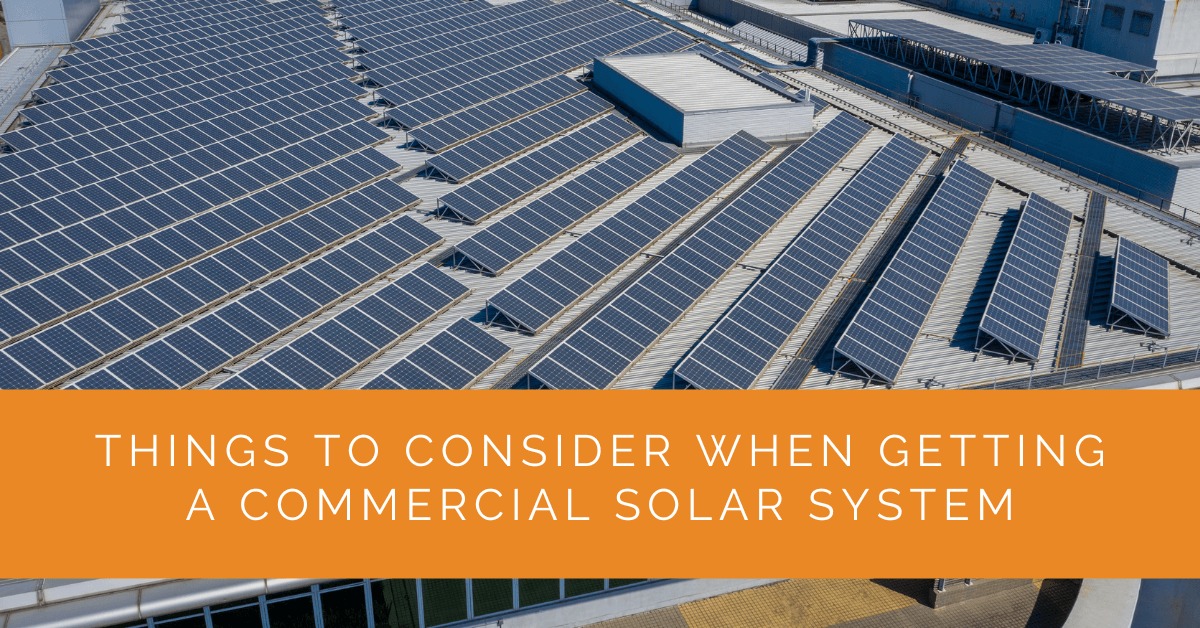The shift towards renewable energy has made commercial solar systems attractive for businesses. By harnessing the sun’s power, companies can reduce their carbon footprint, lower energy costs, and promote sustainability. However, before embarking on a commercial solar installation journey, several crucial factors must be considered. This article will guide you through selecting and installing a commercial solar system, providing valuable insights and expert advice.
Contents
- 1 Key Takeaways
- 2 Factors to Consider Before Installing a Commercial Solar System
- 3 Planning and Preparation for Commercial Solar Installation
- 3.1 Developing a Business Plan for Solar Panel Installation
- 3.2 Identifying the Right Solar Panel Installation Company
- 3.3 Obtaining Necessary Permits and Approvals
- 3.4 Allocating Budget and Financing Options
- 3.5 Opening a Business Bank Account for Solar Investments
- 3.6 Acquiring Business Insurance Coverage
- 4 Selecting the Right Solar Panels and Equipment
- 5 Hiring a Professional Solar Installation Team
- 6 Maximizing the Benefits of a Commercial Solar System
- 7 Case Study: Implementing a Commercial Solar System for Sustainable Business Operations
- 8 Expert Insights From Our Solar Panel Installers About Things to Consider When Getting a Commercial Solar System
- 9 Experience Solar Excellence with Us!
- 10 Conclusion
- 11 FAQ
Key Takeaways
- Assess your business’s energy requirements, evaluate your rooftop suitability, and research solar panel efficiency and equipment to make informed decisions when getting a commercial solar system.
- Proper planning and preparation, including developing a business plan, selecting the right solar panel installation company, and obtaining necessary permits and approvals, are crucial for a successful solar installation.
- Maximize the benefits of your commercial solar system by optimizing energy efficiency, monitoring and maintaining the system, educating employees and stakeholders, and exploring additional renewable energy solutions to promote sustainability and environmental responsibility.
Factors to Consider Before Installing a Commercial Solar System
Assessing Energy Requirements and Consumption
To determine your commercial solar system’s appropriate size and capacity, it’s essential to assess your business’s energy requirements and consumption patterns. Analyzing historical energy bills and understanding peak demand periods will help you estimate the solar capacity needed to effectively meet your organization’s energy needs.
Analyzing Roof Suitability for Solar Panels
The suitability of your rooftop for solar panel installation is a critical consideration. Factors such as roof orientation, tilt, shading, and structural integrity significantly maximize solar energy production. Engaging a professional solar installer to conduct a thorough roof assessment will ensure optimal solar panel placement and performance.
Determining Available Space for Solar Installation
The available space for solar installation is another crucial factor to consider. Assessing your property’s footprint and identifying potential areas for solar panel placement will help determine the available system size and design options. Additionally, considering future expansion plans or obstructions on your premises is vital for long-term solar system scalability.
Evaluating Potential Savings and ROI
One of the primary motivations for investing in a commercial solar system is the potential for long-term cost savings and return on investment (ROI). It’s essential to calculate the projected energy savings based on your business’s current energy consumption and the prevailing electricity rates. Additionally, considering available solar incentives, tax credits, and financing options will provide a comprehensive picture of the financial benefits of going solar.
Understanding the Installation Process
Understanding the solar panel installation process is crucial to seamlessly transitioning to solar energy. It typically involves site visits, system design, obtaining permits, panel mounting, electrical work, and final inspections. Collaborating with an experienced solar installation company will simplify the process and ensure compliance with local regulations and safety standards.
Researching Solar Panel Efficiency and Equipment
Solar panel efficiency directly impacts the energy output of your commercial solar system. Researching and comparing various solar panel brands, technologies, and efficiency ratings will help you select panels that maximize energy production. Additionally, considering the quality and durability of solar equipment, such as inverters and racking systems, will ensure the long-term reliability of your solar system.
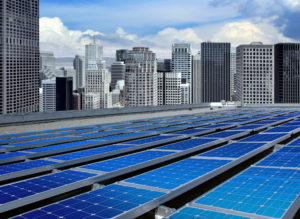
Planning and Preparation for Commercial Solar Installation
Developing a Business Plan for Solar Panel Installation
Before diving into solar installation, developing a comprehensive business plan is crucial. This plan should outline your goals, budget, expected ROI, and marketing strategies. Conducting thorough market research and assessing the competitive landscape will also help you identify opportunities to differentiate your solar panel installation company.
Identifying the Right Solar Panel Installation Company
Selecting the right solar panel installation company is paramount to the success of your commercial solar project. Look for experienced professionals with a proven track record and positive customer reviews. Request multiple quotes, evaluate warranties, and consider the company’s expertise in commercial installations. It’s also important to inquire about their after-sales support and maintenance services.
Obtaining Necessary Permits and Approvals
Solar panel installations typically require permits and approvals from local authorities. Working with a reputable solar installation company will ensure that all the necessary paperwork is completed accurately and promptly. They will handle the permitting process, ensuring compliance with building codes and regulations.
Allocating Budget and Financing Options
Determining your budget for commercial solar installation is crucial. Consider the upfront costs, including equipment, installation, and permitting fees. Explore financing options such as loans, leases, power purchase agreements (PPAs), or solar-specific financing programs. Some financial institutions offer special solar loans or lines of credit, making it easier to finance your solar project.
Opening a Business Bank Account for Solar Investments
Separating your solar investments from other business finances is a sound practice. Opening a dedicated business bank account for your solar system allows you to track expenses, monitor savings, and simplify accounting processes. Consult with your financial institution to explore the best banking options for your solar investments.
Acquiring Business Insurance Coverage
Insurance coverage is essential to protect your commercial solar investment. Consult with an insurance agent specializing in renewable energy to understand the specific coverage required for your solar system. General liability insurance, property insurance, and equipment coverage are common policies for solar installations. Adequate insurance coverage will provide peace of mind in unforeseen events or damages.
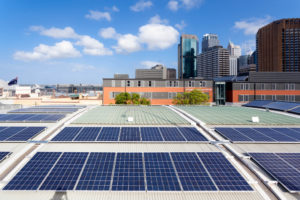
Selecting the Right Solar Panels and Equipment
Researching and Comparing Solar Panel Brands
With numerous solar panel brands available in the market, it’s crucial to research and compare their specifications, performance, and reliability. Look for reputable manufacturers with a proven track record and positive customer reviews. Consider efficiency, durability, warranty coverage, and bankability when selecting solar panels for your commercial system.
Evaluating Solar Panel Efficiency and Performance
Solar panel efficiency refers to the amount of sunlight that can be converted into usable electricity. Higher-efficiency panels generate more electricity within a given area, making them suitable for commercial installations with limited space. Evaluate the efficiency ratings of different panels and balance them with cost considerations to determine the best fit for your business.
Considering Warranty and Maintenance Support
Solar panels are a long-term investment, and it’s crucial to consider warranty coverage and maintenance support. Look for panels with solid manufacturer warranties that cover defects, performance, and durability. Additionally, inquire about the maintenance and support services offered by the solar panel installer. Regular maintenance and timely repairs ensure optimal system performance and longevity.
Exploring Additional Solar Equipment Options
Depending on your energy needs, you may require additional solar equipment. This includes inverters, batteries, monitoring systems, and energy management software. Evaluate the compatibility and reliability of these components with your solar panel system. Consult with your solar installer to determine if these additional equipment options are necessary to meet your business’s requirements.
Understanding the Impact of Solar on Business Operations
Integrating a commercial solar system impacts various aspects of your business operations. Understanding the implications on energy consumption, utility bills, and grid interconnection is vital. Additionally, educate your staff on the benefits of solar energy and implement energy-saving practices to maximize the system’s effectiveness. Consider the long-term sustainability goals of your organization and align them with your solar energy system.
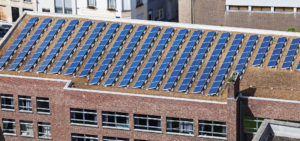
Hiring a Professional Solar Installation Team
Conducting Background Checks and References
Conduct thorough background checks and request references when selecting a solar installation company. Look for companies with a proven track record of successful commercial installations. Contact their previous clients to inquire about their experience, professionalism, and satisfaction with the installation process.
Verifying Licenses and Certifications
Ensure that the solar installation team possesses the licenses and certifications required by your state or local jurisdiction. Proper licenses validate their expertise and adherence to industry standards. Additionally, certifications from reputable organizations such as the North American Board of Certified Energy Practitioners (NABCEP) indicate their knowledge and competency in solar installations.
Reviewing Installation Contracts and Agreements
Before proceeding with the installation, review and understand the installation contracts and agreements provided by the solar installation company. Pay attention to project timelines, deliverables, warranties, and associated costs. Seek legal advice if needed to ensure clarity and protection of your rights as a customer.
Ensuring Compliance with Safety and Quality Standards
Safety and quality should be top priorities during the solar installation process. Ensure the solar installation company follows industry best practices and complies with all safety regulations. They should have robust safety protocols, trained technicians, and insurance coverage—request information about safety certifications and previous safety records.
Monitoring the Installation Process
During the installation process, stay engaged and informed. Regularly communicate with the solar installation team to ensure the project progresses as planned. Address any concerns promptly and seek updates on project milestones. Monitoring the installation process will help identify and resolve any issues promptly, ensuring a successful and efficient solar installation.
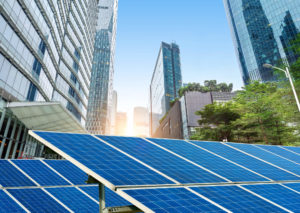
Maximizing the Benefits of a Commercial Solar System
Optimizing Energy Efficiency and Savings
To maximize the benefits of your commercial solar system, focus on energy efficiency. Implement energy-saving practices, such as installing LED lighting, optimizing HVAC systems, and utilizing smart energy management technologies. By reducing overall energy consumption, you can lower your utility bills and increase the return on your solar investment.
Monitoring and Maintaining the Solar Power System
Regular monitoring and maintenance are crucial for your commercial solar system’s optimal performance and longevity. Monitor energy production, system performance, and any potential issues using monitoring software or tools provided by your solar installer. Schedule periodic maintenance checks to ensure all components function correctly and efficiently.
Educating Employees and Stakeholders about Solar Energy
Education and awareness are key to maximizing the benefits of your commercial solar system. Educate your employees and stakeholders about solar energy, its environmental benefits, and the impact of solar installation on your business operations. Encourage energy-saving behaviors and provide training on utilizing the solar system effectively.
Exploring Additional Renewable Energy Solutions
A commercial solar system is just a broader renewable energy strategy component. Consider exploring other renewable energy solutions, such as wind turbines, geothermal systems, or energy storage technologies. Integrating multiple renewable energy sources can enhance the sustainability and resilience of your business’s energy infrastructure.
Promoting Environmental Responsibility and Sustainability
By adopting a commercial solar system, your business demonstrates its commitment to environmental responsibility and sustainability. Promote your solar installation through marketing and public relations efforts. Highlight the positive environmental impact, cost savings, and your organization’s dedication to a cleaner energy future. Engage with your community, customers, and industry peers to inspire others to embrace renewable energy.
Case Study: Implementing a Commercial Solar System for Sustainable Business Operations
Background
At Solar Panels Network USA, we strive to help businesses transition to renewable energy through the implementation of commercial solar systems. One of our recent projects involved a mid-sized manufacturing company looking to reduce its energy costs and carbon footprint by installing a solar power system. This case study highlights our approach and the benefits realized by integrating solar energy into their operations.
Project Overview
The manufacturing company, facing high electricity costs and committed to sustainability, sought to install a commercial solar system. They approached us to assess their energy needs, evaluate their rooftop suitability, and design a system that would meet their goals. Our mission was to ensure a seamless transition to solar energy while maximizing financial and environmental benefits.
Implementation
Assessing Energy Requirements and Roof Suitability
Our first step was to analyze the company’s historical energy bills and consumption patterns. This assessment helped us estimate the required solar capacity to meet their energy demands. Concurrently, we conducted a thorough roof assessment to determine the best locations for solar panel installation, considering factors such as orientation, tilt, and potential shading.
Designing and Installing the Solar System
Based on our assessments, we designed a customized solar solution featuring high-efficiency monocrystalline panels. These panels were selected for their superior performance and durability, ensuring long-term energy production. The installation involved securely mounting the panels on the rooftop, optimizing their placement for maximum sunlight exposure.
Obtaining Permits and Ensuring Compliance
Navigating the permitting process was crucial for the project’s success. We handled all the necessary paperwork and ensured compliance with local regulations and safety standards. This step was essential to avoid delays and ensure the system’s legal and operational compliance.
Integrating Battery Storage
To enhance energy efficiency and resilience, we integrated advanced battery storage systems. These batteries store excess solar energy generated during the day, making it available during peak demand periods or at night. This approach not only maximized self-consumption but also provided a reliable backup power source during grid outages.
Results
Significant Cost Savings
The manufacturing company experienced substantial reductions in their energy bills. By generating their own electricity, they decreased their reliance on grid power, resulting in lower monthly utility costs. The battery storage further optimized their energy usage, allowing them to utilize stored energy during high-cost periods.
Enhanced Sustainability
The shift to solar energy significantly reduced the company’s carbon footprint. By relying on renewable solar power, they minimized greenhouse gas emissions, aligning with their commitment to environmental sustainability. This transition supported broader efforts to combat climate change and promote eco-friendly practices.
Improved Energy Independence
With the integration of battery storage, the company gained greater energy independence. The stored solar energy ensured continuous operations during power outages, enhancing their resilience and stability. This capability was particularly valuable for maintaining productivity and avoiding downtime.
Increased Property Value
The installation of a commercial solar system added significant value to the company’s property. The long-term energy cost savings and sustainability features made the property more attractive to potential buyers and investors. This increased marketability and overall asset value.
Summary
Our project with the manufacturing company demonstrated the comprehensive benefits of implementing a commercial solar system. By accurately assessing energy needs, optimizing roof suitability, and integrating advanced solar technology, Solar Panels Network USA helped the company achieve significant cost savings and enhanced sustainability. This case study underscores the practical and environmental advantages of adopting solar energy in commercial operations, paving the way for a greener and more cost-effective future.
Expert Insights From Our Solar Panel Installers About Things to Consider When Getting a Commercial Solar System
As an experienced installer, I emphasize the importance of assessing your business’s energy requirements accurately. Understanding consumption patterns is crucial for determining the right system size and maximizing efficiency.
Senior Solar Installer
Proper roof assessment is key to optimizing solar panel placement. Factors like orientation, tilt, and shading must be evaluated to ensure maximum energy production and system performance.
Lead Solar Technician
Selecting the right solar equipment and ensuring quality installation can significantly impact the long-term reliability and savings of your commercial solar system.
Solar Project Manager
Experience Solar Excellence with Us!
Trust in Solar Panels Network USA, where our seasoned experts deliver top-quality solar solutions for homes and businesses nationwide. With a legacy of countless successful installations and a commitment to sustainable energy, we’re your reliable partner in the solar journey. Ready for a brighter, eco-friendly future? Call us now at (855) 427-0058 and harness the power of the sun!
Conclusion
Installing a commercial solar system is a significant decision for any business. By considering the factors mentioned in this article, conducting thorough research, and collaborating with experienced professionals, you can make an informed choice that aligns with your energy goals, financial objectives, and commitment to sustainability. Embrace the power of solar energy and embark on a greener and more cost-effective future for your commercial operations.
Installing solar panels allows for an opportunity to reduce energy costs, promote sustainable practices, and contribute to a cleaner environment. Take the necessary steps to assess your business’s energy requirements, evaluate your rooftop suitability, select the right solar panels and equipment, and engage a professional solar installation team. By carefully considering these factors and maximizing the benefits of your commercial solar system, you can position your business for long-term success in the evolving solar industry.
Remember, the solar installation cost should be viewed as an investment, with long-term savings and environmental benefits that outweigh the initial expenses. Embrace the power of solar energy, capitalize on available incentives and financing options, and join the growing community of businesses making a positive impact through renewable energy solutions.
FAQ
How do you size a commercial solar system?
To size a commercial solar system, you must assess your business’s energy requirements and consumption patterns. Analyzing historical energy bills and peak demand periods will help estimate the solar capacity needed. Consulting with a professional solar installer will ensure accurate sizing based on your business needs.
Which type of solar panel is best for commercial use?
The best type of solar panel for commercial use depends on various factors such as efficiency, durability, cost, and available space. Monocrystalline and polycrystalline panels are commonly used in commercial installations due to their high efficiency and reliable performance. However, consulting with a solar panel expert is recommended to determine the most suitable type for your specific requirements.
What’s the difference between commercial and residential solar panels?
Commercial and residential solar panels differ in size, capacity, and design. Commercial panels are typically larger and have a higher capacity to meet the energy demands of businesses. Residential panels, on the other hand, are smaller and designed for individual household energy needs. Commercial panels are also engineered to withstand higher voltage and incorporate features suitable for larger-scale installations.
About the Author
Solar Panels Network USA stands at the forefront of solar energy solutions, driven by a team of seasoned solar engineers and energy consultants. With over decades of experience in delivering high-quality solar installations and maintenance, we are committed to promoting sustainable energy through customer-centric, tailored solutions. Our articles reflect this commitment, crafted collaboratively by experts to provide accurate, up-to-date insights into solar technology, ensuring our readers are well-informed and empowered in their solar energy decisions.

